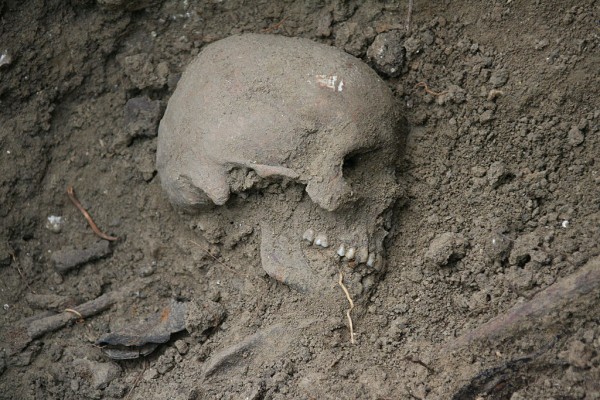Archaeologists from the Hubei Provincial Institute of Cultural Relics and Archaeology have uncovered a well-preserved human skill in China that is dated one million years ago while excavating in the central province of Hubei. It was a complete fossilized skull identified as belonging to an archaic human who lived during the Middle Pleistocene Epoch.
There are two previous skulls of ancient hominins found before, but the recent discovery is the first complete archaic human skull. The Hubei Daily reports that the fossilized skull has been dubbed the “Yunxian Man” and was the skull of a Homo erectus that first appeared about two million years ago.
 (Photo : VALERY HACHE/AFP via Getty Images)Picture of a skull of one of the 13 German soldiers who where killed in southern France in August 1944 and exhumed from a makeshift forest grave, 18 October 2006 in Villeneuve-Loubet, southern France.Meet the Yunxian Man
(Photo : VALERY HACHE/AFP via Getty Images)Picture of a skull of one of the 13 German soldiers who where killed in southern France in August 1944 and exhumed from a makeshift forest grave, 18 October 2006 in Villeneuve-Loubet, southern France.Meet the Yunxian Man
The well-preserved skull was found at the same site where the two first skulls were found more than 30 years ago. The previous skulls were distorted during the fossilization process, unlike the latest one which is almost still complete without any visible distortion.
The head of the Institute of Cultural Relics and Archaeology excavation team Lu Chengqiu explained in the Hubei Daily article said that the new skull is similar to the first two in terms of the burial environment, fauna remains, and the characteristics of stone products also found in the site.
Archaeologists have already excavated the frontal bone, orbit, and other parts of the skull. The rest are expected to be excavated before November, the South China Morning Post (SCMP) reported.
Chengqiu said that the team had unearthed a large number of animal fossils and stone tools that should be the same age as the skull. These stone tools suggest that Yunxian Man is more likely herbivorous.
Incredibly Rare Discovery
The team who discovered the third skull is carefully excavating the area to not cause any damage to the rare and valuable fossil. According to Ancient Origins, they have dug down far enough to excavate the head. Excavation is expected to continue until the skull can be removed from the ground.
Archaeologists noted that the discovery has irreplaceable research value, fitting the missing gaps in the evolutionary history of Homo erectus in East Asia. Team leader Gao Xing said there are very few human fossils around 1 million years old found in China and East Asia since the Yuanmou Man dates back 1.7 million years ago, and the Lantian Man was around 1.2 million years ago.
They are hopeful that they can learn more from the complete and well-preserved Yunxian Man to further understand the origins of Homo erectus in the region. Once the skull is fully excavated, they will be able to conduct further study and analysis.
More so, the human skull will hopefully provide excellent data on ancient humans’ brain volume based on regional variations between the different versions of species compared to other skulls of Homo erectus found elsewhere in the world. This information is extremely useful in reconstructing evolutionary timelines and histories from a limited number of high-quality samples.
Sources:sciencetimes.com








